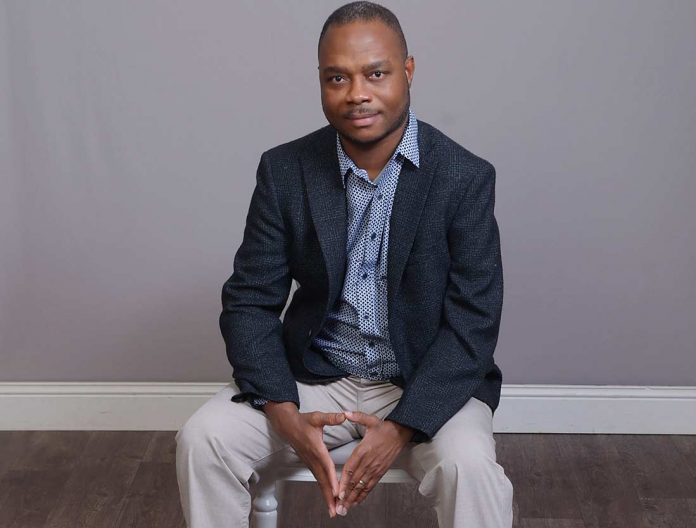
Adversity started early for Liberian-born Richmond Appleton. At age 5, he was stricken with polio. At around the same time, the beginning of a civil war started to engulf the West African coastside country, leading to the deaths of 250,000 people over a 14-year period. Now residing in Gilroy, Appleton tells his life story in his recently published autobiography, “Finding Peace: A Refugee’s Story From Peril to Protection,” which is available on Amazon.
Appleton’s wife, TaLeiza Calloway-Appleton, is happy that through the book and local publicity, an increased audience will get to know her husband for who she says he is: a caring father and husband who hasn’t let his past define him.
“What struck me most as I got to know Richmond was his resiliency and ability to be so positive and ambitious,” she said. “His perspective is just inspiring for someone who went through what he went through because anyone could be sad and depressed and really downtrodden. He has such a remarkable story, but he uses it as fuel to be better. He uses it as motivation to work harder and to be an example for others, and I think that is incredible.”
When TaLeiza uses words like ambitious, positive, resilient and fearless to describe her husband, she’s not simply being polite or dabbling in hyperbole. After all, when you’re Richmond Appleton, and you grow up in a country in the midst of a brutal civil war that eventually leads to the death of a quarter million people, you’ll need those traits in abundant amounts to survive.
In 1994, at age 10, Richmond moved 150 miles away from his parents’ home to attend a charter school in Monrovia, the capital of Liberia. In October 1999, he and some of his family members had little choice but to embark on a dangerous journey to flee the country due to the civil war, with the goal to reach a refugee camp for Liberians in Ghana.
They eventually made it, but not before encounters in which they stared down the barrel of a gun and slept on streets “where the dust will make you sick,” all against the backdrop of occasional explosions and gunfire. Near the end of 2003, the family received an approval letter that would allow them to relocate to the U.S. in spring 2004. It was during the 14-day drive from Monrovia to Ghana in which Richmond started to examine his Christian faith and truly put his trust in Jesus Christ.
“Jesus Christ became my cornerstone and was the one to sustain me through everything,” he said.
Adverse childhood
The youngest of seven children, Richmond grew up in a small fishing village, where his parents raised cows, sheeps, goats, planted rice and plantains, and brewed their own rum to sell. Living in a farming village where everyone worked laborious hours, Richmond felt a sense of worthlessness as he was unable to do any manual labor due to polio, which resulted in the left side of his body being paralyzed.
“From 5 to 8 years old, I remember my mom and brothers taking turns carrying me on their back when we walked long distances,” he said. “In the village, there were no cars, so I was being carried for long periods of time. I felt very alone. Kids would be playing out, but I wasn’t able to play. Kids would be helping their parents on the farm, but I wasn’t able to do that. My mom was always afraid to let me out in the public because there was a lot of discrimination toward people with polio. It was a very lonely time for me.”

When Richmond was 10, several members of his family wanted to enroll him at a charter school in Monrovia to give him a chance to “maybe make something out of myself academically.” One day, a plan was presented to Richmond’s mom that would relocate Richmond and have him live with his older siblings in Monrovia. One of Richmond’s sisters had a friend who was a designated peacekeeper and could provide transportation through various checkpoints en route to Monrovia.
“Let me think about it,” Richmond’s mom said. “I’m going to the village to get some food. When I come back, I’ll make my decision.”
That’s the last time Richmond ever saw his mom again. While his mom was away, an armored vehicle with soldiers arrived at the family’s farm with some urgent news. Richmond had to leave immediately because “there was imminent danger and we couldn’t get stuck in a crisis,” Richmond said. Richmond’s dad and brothers made the decision for Richmond and his sister to get in the vehicle and depart.
“My mom came back and I was gone, and she was very sad because she didn’t get to give me a last blessing,” Richmond said. “I remember crying not being able to say goodbye to my mom because we had gone through this long journey together. When I had polio she was the one taking me place to place, trying to find ways to heal me. There were no hospitals or anything like that, so she tried different things like taking me to native healers. Just two buddies toughing it out every step of the way.”
Even though Richmond started to regain strength on the left side of his body starting when he was 9, he still walked with a noticeable limp, a result of muscle atrophy. Attending formal school for the first time ever in Monrovia at age 10, Richmond became the butt of constant jokes, teasing and bullying.
“When I was finally able to walk again, I became a source of ridicule,” he said. “People tried to start fights with me, but I couldn’t fight back. It was terrible.”
But Richmond soon realized that being afflicted with polio was a hidden blessing, unbelievably enough. He vividly recalls instances in which his disability saved him from potential death.
“One time I was being interrogated for being on the wrong side of town at a checkpoint, and one of the armed people said, ‘He’s a cripple, let him go,’” Richmond said. “It was the first time my disability actually kept me safe. Another time children were being grabbed and captured by soldiers. I got pulled away and was told that I would be joining their revolution. Then they realized I was weak and they let me go. In some instances, if they can’t use you, they kill you. But they let me live. I look back and even though polio was the reason I got bullied, it also saved my life.”
Odyssey of a lifetime
Richmond lived in Monrovia for five years with his brother Nyema, sister Beatrice, niece Mawaye, and nephew Steven when Nyema made the decision that the family had to flee the city as the area was becoming increasingly life-threatening, Richmond said. In October 1999, they left in the middle of the night and got on a bus in hopes of reaching a refugee camp in Ghana, two countries and approximately 1,000 miles away.
Once there, they would apply for a refugee program to resettle with family members already in the U.S. That was the plan, anyway. The 14-day trek to Ghana involved crossing through multiple checkpoints in Liberia to the Ivory Coast, which borders Ghana and Liberia. At every checkpoint, Richmond’s family was questioned and could’ve been turned back or even thrown in jail, he said.
“It was really a miracle we got across the border to the Ivory Coast,” he said. “It was such an emotional moment because from there we didn’t have to deal with any more interrogations at checkpoints.”
Once they got to the refugee camp in Ghana, Nyema was able to contact one of his sisters who was already living in Brooklyn Park, just outside of Minneapolis. They began filing paperwork for resettlement in the U.S., which they received approval of in July 2001. However, because of the 9/11 attacks on the World Trade Center, the family had to redo medical examinations and additional paperwork, delaying their departure until 2004. The glorious hope of the future clashed with the despair of the present.
“In the refugee camp, you can see the desperation and hopelessness in people and yourself,” Richmond said. “I remember thinking, ‘How can we live here?’ All we could do was try to find an area where we could pitch a tent and try to sleep. At least we were out of war.”
The family resided in the camp for five years, but the wait was well worth it. On Feb. 27, 2004, as the plane touched down at Minneapolis-St. Paul Airport, Richmond, then 19, felt like he was watching a movie.
“At first as the plane approached the airport on our descent to the ground, I thought it was the ocean, but the passenger seated next to me confirmed it was snow,” he said.
“Your first visit to Minneapolis?” she asked. He answered: “My first day in America,” and she smiled and said, “Oh, welcome.”
New beginnings
TaLeiza and Richmond met on a typically frigid Minnesota winter night in February 2011 at a city reggae event in St. Cloud, where TaLeiza was working as a journalist and Richmond was finishing up his undergraduate degree at St. Cloud State University. TaLeiza was sitting with her friend and sipping cranberry juice when Richmond walked into the bar area.
They hit it off from the get-go, though neither of them did much dancing. Instead, the two literally talked the night away. When it was time to go home, Richmond walked TaLeiza to her car in sub-freezing temperatures. Chivalry, it turns out, was far from dead.
“He earned some extra stars for that,” TaLeiza said. “Then he texted me later to make sure I got home safely since it was snowing and cold. I thought it was the greatest thing in the world and that he was quite the gentleman.”
When they got married on June 15, 2013, they jumped the broom, a traditional act in which the newlyweds hold hands and jump over a broom, signifying a sweeping away of the old and welcoming new beginnings. Not only was it symbolic of their union, but TaLeiza said it spoke to Richmond’s tenaciousness to never give up and continually embark on new chapters in his life.
“I’m so grateful he doesn’t look at his past experiences as a burden or scar in life,” TaLeiza said. “He looks at it from a perspective of something that has made him stronger and makes him want to be a better version of himself knowing where he’s come from. He didn’t let his past cloud his future.”
And yet Richmond didn’t sugarcoat things when he said he is still haunted by the fact that he never got to say goodbye to his mom, who died in 2010. Richmond and one of his sisters flew to Liberia to attend her burial that year.
“I still wish we had that final moment together,” he said. “I never got a chance to go back to the village once I resettled in the U.S. because the war kept going and it was dangerous. The war overran the entire city where my parents lived.”
In an excerpt from his book, Richmond summed up his situation best when he wrote: “I have always been on a journey of movement, and I have been through many experiences that, at this point, I have become content with myself. I believe it in my heart that the best is yet to come. Even though I do not see or feel what I hope for at the time, I know I have been in situations where the future looked bleak and empty, yet I have made it.”









